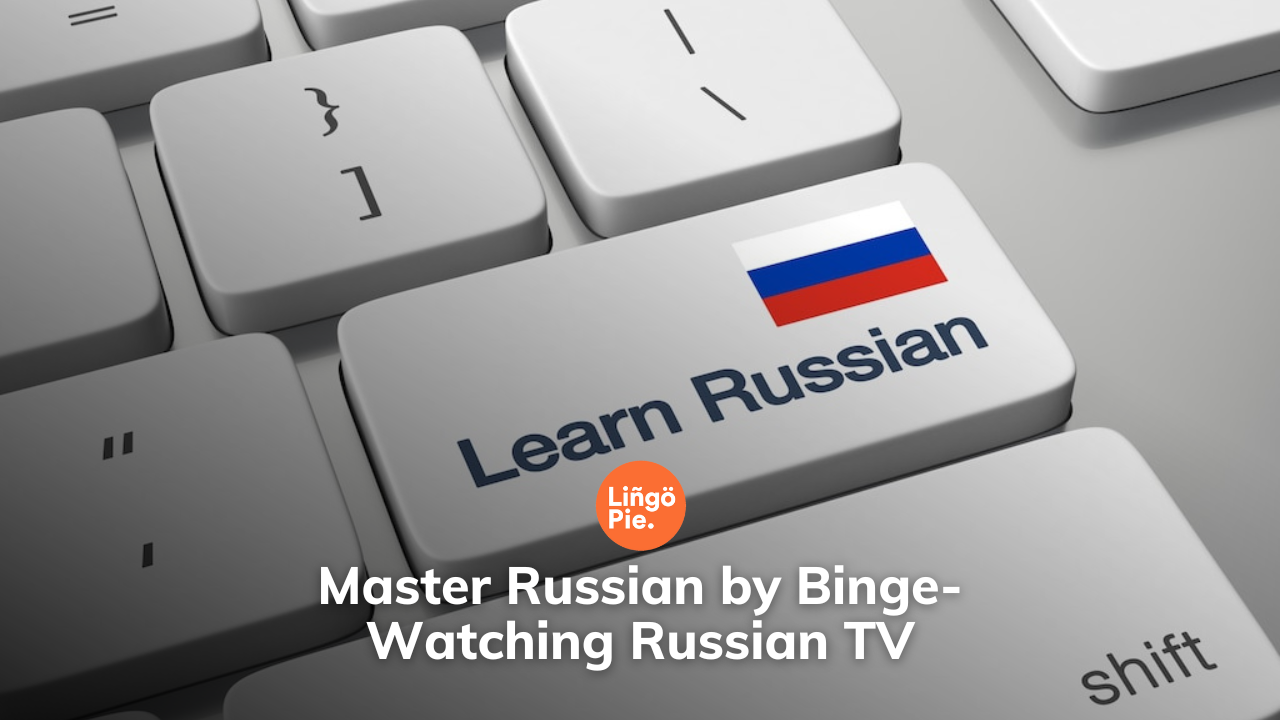When it comes to watching TV to learn Russian, you'll find a broad range of shows and series from which to choose. There is something for everyone, no matter your age or preferences.
From thrilling crime dramas and historical epics to heartwarming comedies, Russian television is filled with choices to cater to all interests.
Whether you're a newcomer to the language or an intermediate learner, this dynamic approach can help you improve your language skills, expand your Russian vocabulary, and gain insight into the diverse accents and colloquialisms used throughout Russia.
In this guide, we'll explore the most effective techniques for learning Russian with TV, including watching Russian TV shows, using Russian subtitles, transitioning from English to Russian subtitles, taking notes on new vocabulary, and discussing episodes with fellow learners in Russian.
So, get ready to dive into the world of Russian television and elevate your proficiency in the Russian language.
Table of Contents
- Utilize Subtitles
- Take Notes on New Vocabulary
- Discuss Episodes with Your Friends (in Russian)
- Beginners Should Watch Kids TV Shows
- Repetitio Est Mater Studiorum
- Where to Find Russian Movies or TV Shows
- FAQs
- Summing Up: How to Learn Russian with Russian TV
Utilize Subtitles

Subtitles are a vital tool for language learners, even if you're already proficient in Russian.
They reinforce listening comprehension, aid pronunciation, and provide context for nuanced expressions. Some phrases are simply too difficult for non-natives that are at a beginner or lower-intermediate level.
Furthermore, watching with subtitles enhances your ability to learn about Russian culture, as you will become familiar with idiomatic phrases and cultural references more easily.
Start with English Subtitles and Transition to Russian
When it comes to learning a Russian with subtitles, begin with English subtitles and transition to Russian. In any language, this is, undoubtedly, the best strategy. English subtitles offer a safety net for learners, enabling comprehension of the plot, character interactions, and scenes.
This gradual shift helps build confidence in understanding and speaking Russian in real-life scenarios.
Lingopie, a platform offering diverse Russian TV series, supports this transition with dual subtitles and an interactive interface.
It's a fantastic resource for those looking to explore Russian culture, enhance language skills, and gradually transition into watching without subtitles, all while boosting language proficiency.
Take Notes on New Vocabulary
When watching Russian movies and TV shows, it's important to take notes on new words and phrases.
Your ability to learn Russian depends on how quickly you are able to build and retain vocabulary; this can be a fun way to discover new words.
Keep a notebook handy, and write down any words or expressions you don't know. After watching, review your notes, find out what these words mean, and practice using them in sentences.
You can also utilize language learning apps and social media platforms like TikTok to help you with this process. You will always find a lot of new words and phrases on language learning apps.
Taking notes is an example of an active approach, and it helps you remember and understand the language better.
By consistently noting new vocabulary, you'll steadily improve your Russian, making your learning experience more effective and enjoyable. After all, progress is fun, right?
Discuss Episodes with Your Friends (in Russian)
Finding a study buddy or fellow enthusiast of Russian culture can be a fantastic way to enhance your skills in any language, and Russian is no different.
If you don't know anyone personally, social media platforms can be a valuable resource for connecting with native Russian speakers or fellow learners.
It will be fun to have someone to help you learn Russian. And of course, talking about episodes of Russian TV shows with friends, (in Russian), offers several advantages.
It provides a real-world context for practicing what you've learned in Russian lessons, and also exposes you to different accents and colloquial language.
Engaging in conversations about the plots, characters, and cultural references found in Russian television shows helps you speak Russian more fluently.
The shared experience can provide mutual support and motivation, making your language journey even more rewarding. Maybe even improve your friendship.
Beginners Should Watch Kids TV Shows
For beginners learning Russian, watching kids' TV shows is a brilliant strategy.
The reason for this is simple. These shows are designed with simplicity in mind, featuring straightforward language, clear pronunciation, and slower speech patterns.
This makes it easier to grasp the fundamentals of the language, including basic vocabulary, grammar, and sentence structure.
Furthermore, kids' programs often employ repetition, which aids in memory retention and comprehension. Visual elements provide context and understanding, even if you're not yet proficient in the language.
You can find these shows on various platforms, such as YouTube channels or dedicated websites for language learners.
Two popular ones to explore are "Masha and the Bear" (if you have kids you may know about this one already as this is a global hit) and "Better than People".
These shows have entertaining content while helping beginners build a strong foundation in Russian.
In addition, they expose you to the language as it's naturally spoken by native speakers, offering a glimpse into Russian history and culture in an accessible way.
Repetitio Est Mater Studiorum

Have you heard this Russian saying before? Of course not, it's Latin! And it explains exactly how learning a new language by watching TV is possible. This cant be a one time (or one week) thing.
Learning Russian by watching TV is entirely possible, but consistency is the key. Dedicate a portion of your daily routine to Russian TV, starting with just 15 minutes a day and gradually increasing your viewing time.
Language acquisition is a gradual process, and while it may take longer without a formal teacher, it's certainly achievable.
Furthermore, make use of language learning apps to supplement your TV watching. These apps often provide flashcards and quizzes related to the content, helping reinforce new words and phrases you encounter.
In addition, YouTube channels that feature Russian content can be a valuable resource for finding shows and programs suitable for your learning journey.
So, start with just 15 minutes a day, and as you become more comfortable, watch more regularly and for longer time periods to make steady progress in learning the Russian language.
Where to Find Russian Movies or TV Shows
When it comes to finding movies and TV shows in Russian, there are many platforms available for you.
You can start your language learning with Netflix, there you can discover a range of Russian content, including popular series like "Better than People" and "The Sniffer". These shows offer engaging storylines while exposing you to the Russian language.
Amazon Prime also offers a selection of Russian movies and shows, with titles like "The Teacher" and "Ice".
For language learners, Lingopie is an excellent platform. Not only does it provide access to Russian TV series, but it also provides dual subtitles, making it easier to follow along and learn new words while watching.
Additionally, you can explore other platforms like YouTube channels featuring Russian content, which may include Russian life vlogs and language lessons.
These options provide a rich source of material to practice your Russian language skills and immerse yourself in the culture.
FAQs: How to Learn Russian with Russian TV
Discover answers to common questions about learning Russian with Russian TV.
From the best platforms to effective techniques, our aim here is to guide you through your language-learning journey with captivating television.
Can you learn Russian by watching TV?
Yes, you can learn Russian by watching TV. It's an effective method to enhance listening skills, expand vocabulary, and grasp cultural nuances. Consistent practice and engagement with Russian television will significantly contribute to your language learning.
What is the fastest way to learn Russian?
The fastest way to learn Russian involves a combination of regular TV immersion, using language learning apps, and practicing with native speakers. Consistency is key, and dedicating time each day to watching Russian TV shows while supplementing with interactive language apps will expedite your learning.
Can I learn Russian from watching movies?
Yes, you can learn Russian from watching movies. While movies may use more complex language, they expose you to authentic dialogue, accents, and cultural contexts. It's an engaging way to advance your Russian, especially when combined with other learning resources.
How many hours to learn Russian?
The number of hours required to learn Russian varies depending on individual factors such as prior language experience, dedication, and the depth of fluency desired. However, regular, focused learning, including watching Russian TV, can lead to noticeable progress within a few months.
Is it hard to get a Russian accent?
Developing a Russian accent may be challenging, but consistent exposure to native speakers, like through Russian TV, can help. Practice pronunciation, intonation, and mimic native speakers to improve your accent gradually. It's a skill that develops over time with dedication and practice.

Summing Up: How to Learn Russian with Russian TV
Learning Russian with Russian TV is an exciting and effective approach to mastering a language spoken by over 258 million people.
The popularity of Russian is undeniable, and there's so many incredible movies and TV shows available. It would be a missed opportunity not to use this abundant resource for language learning.
By immersing ourselves in Russian content, we not only enhance language skills but also gain insight into a rich and diverse culture.
Sign up to Lingopie today and start your free trial. Soon, you'll find yourself watching, understand, and speaking Russian.




![13 Best Films on Netflix to Learn Italian [For Beginners]](/blog/content/images/2023/10/Spanish-1-4.png)




